- Home
- Will Hobbs
City of Gold Page 2
City of Gold Read online
Page 2
As it turned out, we never talked with Durango’s marshal. His clerk told us we should’ve gotten off the train one stop sooner, in Animas City. The location of the alleged crime—our place in Hermosa—was in the jurisdiction of La Plata County’s sheriff. Rather than take the electric streetcar at a nickel apiece, we decided to hoof it. Animas City was only two miles up the river.
3
Muster a Posse!
LUCKY FOR US, we didn’t have to wait to talk to the county sheriff. Nonetheless, Till was clearly dismayed as he laid eyes on the lawman, and I knew why. The sheriff wasn’t carrying a gun. Otherwise Bud Norton looked the part with his walrus mustache, ten-gallon hat, and riding boots. Ma had barely broached the theft of our mules when Norton broke in with “Heard of you folks.”
Ma was displeased but the sheriff didn’t notice. “You’re from the vicinity of Lawrence, Kansas. Quakers, I heard tell.”
“The Religious Society of Friends, yes.”
“Lost your husband to consumption—is that correct?”
Ma nodded, adding nothing.
“I’ve seen you around town. A pretty sight I might add.”
Ma had no patience for that sort of tomfoolery. Her eyes went steely but the sheriff was too full of himself to notice. “They say your husband’s brother willed his Hermosa property to you. Some folks around here called him ‘Lucky Jacob Hollowell.’ As the story goes, he bought that ground with his winnings from a card game in Cripple Creek, I believe it was.”
Till was about to say he was right about that, but a sharp glance from Ma kept his tongue holstered. Ma had made an uneasy peace with inheriting an acreage won by gambling.
Uncle Jacob had written us a letter about the card game. He cleared out of Cripple Creek the next day. He’d heard good things about the San Juan Mountains and how fertile the soil was in the Animas Valley up the river from Durango.
“He went to work in the mines in Silverton to save up the money to get his farm going,” the sheriff continued. “Then he worked over the mountain in Telluride. Nobody called him lucky after he fell down the shaft in the Smuggler-Union Mine last winter.”
Ma didn’t flinch. “All we learned was, he died in a mining accident.”
“Fell how far?” Till had to know.
The sheriff scratched his whiskers. “Nigh a thousand feet, I heard tell.”
Till’s eyes went big as he looked my way.
“About our mules,” Ma said, and had me relate what happened.
The sheriff was attentive, I’ll give him that much. When I was done he said, “We don’t get much rustling these days.”
I remembered about the metal rod in the fire and told him about it.
“That would be a running iron,” the sheriff said. “It’s got a small bend on the business end. Rustlers use it to change one brand into another. That corral you mentioned has got a chute where he could confine your animals and rebrand ’em.”
I described what our mules looked like and gave him a sketch of our brand, adding that it was the Greek letter omega.
“Why omega?” asked the sheriff.
“It means ‘the end,’” Till blurted. “Pa put it by their rear ends! It’s a joke!”
After forcing a chuckle, Sheriff Norton grabbed a pencil and closed the open space at the bottom of the omega. “I’d wager your thief did this with his running iron—now it looks like a tall hat. Your pa shouldn’t have chosen a brand so simple to alter.”
I asked Norton where the Hermosa Trail went. “Clear up Hermosa Creek,” he said, “to where it heads at Bolam Pass. But after the first fifteen or twenty miles, there’s a side trail goes over the hill to lower Cascade Creek and meets up with the wagon road to Silverton.”
“You figure the rustler is headed to Silverton?”
“Most likely. There’s enormous numbers of mules up there hauling supplies to the mines. They’re tougher than horses, more hardy, eat less.”
“Smarter,” I added. “So, what can you do?”
When he hesitated, Till cried, “Muster a posse!”
The sheriff was amused. “Our citizens would be mighty rusty at that sort of thing and unlikely to sign up. I’ll send a telegram to all the marshals and sheriffs in the mining towns and counties so they can be on the lookout.”
“Horse and mule thievery is a hangin’ offense,” Till said darkly.
“Not in La Plata County. But when we catch him, he’ll do jail time in the state pen.”
Till wasn’t done. “I know for a fact about an outlaw gettin’ hung in Durango back in ’81.”
“That was a lynching, son, not a legal hanging. Durango was barely getting started. How’d you know about that, being so recently arrived?”
“Been askin’ around,” Till replied.
“Nineteen years ago Durango was sure enough wild and woolly. Two outfits of cattlemen from New Mexico were up here shooting it out. Some of ’em had been shady characters in the Lincoln County War, ran with William Bonney, if you’ve heard of him.”
Till jumped to his feet. “Billy the Kid! And Billy the Kid rode with the Stockton gang here in Durango.”
“Wait a minute, where’d you get that?”
“From a book. Billy the Kid might still be alive.”
“Don’t believe everything you read in them ‘Blood and Thunders.’ Billy the Kid is moldering in the grave, same as Jesse James.”
Till gave the sheriff a dirty look. “But not Bob Leroy Parker.”
The sheriff seemed to be wondering how to extricate himself from this conversation. He shouldn’t have gotten Till started.
Ma said, “Sit down, Till, that’s quite enough. That is not what we came here for.”
Till shot me a look. He didn’t appreciate getting schooled by the sheriff. He was opposed to any sort of schooling, and getting cut off by Ma hurt his pride.
The visit was about over, but Ma had a few things to add. In parting she made sure the sheriff knew we were in dire straits without our mules.
“I’ll sure let you know if I learn anything.”
Ma looked unhappy, but she said, “We’d be much obliged.”
As Norton saw us to the door, I noticed a glint in Till’s eye, and realized what a perilous position the sheriff was in relative to Till’s right foot. I stepped between them and we were out on the street, disappointed to put it mildly. As to the sheriff, he would never know how close he came to a royal shin kicking.
“Who’s Bob Leroy Parker?” I asked Till a minute later.
“Butch Cassidy,” he mumbled.
4
Moneybags
IN THE DUMPS after seeing the sheriff, we waited at the depot in Animas City for our ride home. Ma was taking a stroll. Along came a kid slinging a bag of newspapers. He unfurled one and called, “Read all about it!” The headline shouted in big bold letters: ROOSEVELT IN COLORADO!
Till bolted from the bench and exchanged a nickel for news of his idol. WHISTLE STOP TOUR BEGINS IN PUEBLO announced the smaller headline beneath.
Theodore Roosevelt, the governor of New York and hero of the war in Cuba, was running for vice president.
“Just think, Owen, in July we were exactly where Teddy Roosevelt is today! Pueblo is where you and me walked Peaches and Hercules in the yards before we switched to the narrow-gauge train. Pueblo is where we met Moneybags!”
I grimaced at the name. “Remember how friendly Moneybags was at first?”
“Oh, yeah, he really admirated H and P.”
Till was always on the lookout for words to mangle. Ma had a theory he would outgrow it, but I had my doubts. You couldn’t educate him any more than you could a snapping turtle.
“For a man in a three-piece suit,” I went on, “Moneybags knew a lot about mules. He asked what kind of training they had. I told him they were a plow team, and mentioned we trained them for riding as well.”
Till gave a snort. “That’s when he said he’d been lookin’ for a good ridin’ mule. He was gonna pay two hundred doll
ars for Peaches! I suspicioned him of somepin’.”
“You suspected him of something? Not that I remember. Like what?”
“He had a fish up his sleeve.”
Our encounter with the stranger in Pueblo turned rapidly south after I declined his $200 offer for Peaches. When he suddenly announced he was willing to buy both our mules, we were dumbstruck.
The stranger reached inside his suit jacket for his wallet. Till looked at me as if to say, What you gonna do now?
“Really,” I told the man, “they’re not for sale.”
“You can’t mean that,” he said, turning on the charm as he brought out four crisp hundred-dollar bills. They looked brand-new.
Though amazed, I wasn’t tempted. “Our mother would say the same.”
“It’s more than twice what they’re worth, take my word on it.”
“Hercules and Peaches are members of the family,” I explained.
Still he insisted, said there was a bank nearby, said he would pay in double eagles if gold suited me better than paper.
When I didn’t respond, the rich man’s demeanor turned dark and demanding. “You’re wrong about your mother. She would say you’re being foolish.”
I thought about that but not for long. I took in the set of his square jaw, his piercing gray eyes, his dandy suit and derby hat, and I got my back up. “No thanks, mister,” I said tersely. The stranger appeared to be a man in his prime, likely his early thirties, healthy and wealthy. What was his problem? Born with a silver spoon in his mouth?
He grabbed my wrist with an iron grip and said, “Look here, boy, I’m being reasonable.”
“But not civil,” I countered. He wasn’t letting go.
It didn’t end well. Till gave him a swift kick in the shin.
My right arm was free again, and we led our mules away. With a glance over my shoulder, I saw Moneybags standing there giving us a long and dirty look.
When we caught up with Ma, we gave her an abbreviated version of the encounter. She got the idea how angry the man had been, how devoid of sympathy. Ma remarked, “Some men have bile in their veins instead of blood.”
In the here and now, Ma returned from her stroll. Along came our train, hauling mining equipment, hay, coal, groceries, lumber, mercantile goods, mail, and two coaches filled mostly with miners heading back to work in Silverton. We boarded and were lucky enough to find seats. We’d be home in fifteen minutes.
The rocking motion of a train would generally put Till to sleep, but not today. When he saw Ma reading the front-page story about Roosevelt, he lit up. “Listen, we could send T.R. a telegram about our perdicament. He would change his plans and commander a train to Durango. He’d get a posse together in a minute. Would we care if some reporters came along? Not if we got Hercules and Peaches back.”
Ma had to agree with that, and said how unfortunate it was that we couldn’t send a telegram out of Hermosa.
I derailed their conversation by whispering to Ma, “I should be there in Silverton when that skunk shows up.”
Ma was considering my proposal, and I went on. “I could take the train to Silverton and check in with the town marshal. He’ll need me to identify the thief and our mules.”
”That may well be exactly what we should do,” Ma allowed, “but we have to do this right. We’re in a bad fix, Owen. We have to get them back.”
“Don’t I know it.”
“Sheriff Norton didn’t give us much thought. I’m not sure his say-so about Silverton is worth much.”
As we got off at Hermosa, a hundred or more crates of fresh-picked apples waiting at the siding were being loaded aboard for Silverton. From a car up ahead, goods were being off-loaded to an old man with a team and wagon. A smile lit Ma’s face. “There’s the man we need to talk to.” It was Joe Buckland, the grizzled old-timer who ran Hermosa’s general store. Buckland had been a friend to my uncle and our indispensable adviser from the day we arrived.
Whenever I went to his store, I was riveted by Joe’s stories from when the San Juan Mountains were part of the wild domain of the free-roaming Utes. During the Civil War, he was one of the first prospectors to cross the Continental Divide and discover silver and gold. The trickle of fortune seekers led to a full-on gold rush in the ’70s, and the Utes were forced to sign away their lands rich in precious metals. When the mines began to be industrialized, Joe wasn’t one of the lucky ones with a lode strike to sell to the companies. Rather than stay in the mountains and work for wages, he settled in Hermosa. Confident the railroad would come, he opened a general store.
Ma and I pitched in to help the old man load his supplies onto his wagon. Till ran up the track to watch the steam engine take on water.
Soon as the train pulled out, Ma said to Buckland, “We need to see you in the worst way.”
5
Leaving in the Morning
THE OLD-TIMER WAS standing on the porch of his store when Ma and I walked up a couple hours later. It was shaded by a pair of huge ponderosa pines. Joe Buckland nodded hello. “Where’s Till?” he said with a grin.
“We left him to his own devices,” Ma replied with a grin of her own. “He’s either fishing for trout in the creek, gunning for prairie dogs with his squirrel gun, or panning for gold in the Animas.”
“The boy’s got it made. What brings you, missus?”
“Trouble.”
“I gathered. Come in and set. I made some fresh coffee. Shouldn’t be as vile as my usual fare.”
Ma had me spool out my story. Buckland listened closely until I reported that Sheriff Norton told us our polecat was most likely going to sell our mules to the mines in Silverton.
“Why Silverton?” scoffed the old man.
Joe pulled out a map that showed all the trails and wagon roads, all the railroads and mining districts of the San Juan Mountains. He showed us the route to Silverton the sheriff had described, and then he pointed out half a dozen side trails and an abandoned wagon road where the stinker might leave the Hermosa Trail before he was halfway to Silverton. The graybeard’s gnarled finger went north to the head of the San Miguel River. “My guess is, he’s headed for Telluride.”
“Why Telluride?” I asked.
“Telluride’s bigger. Produces more gold than Silverton and employs more mules.”
“He’d have to go clear over the mountains to get there, looks like.”
“To my mind, a cunning thief would figure he’d less likely get caught if he made the longer trip to Telluride. Silverton’s too obvious.”
Ma had been listening closely. “Is there a train to Telluride that Owen could take?”
“Sure is, the Rio Grande Southern out of Durango. It reached Telluride in ’91. But who’s to say your thief isn’t headed somewhere other than Silverton or Telluride? Maybe he intends to keep your mules for himself. Our sheriff’s got horses and deputies, and should be tracking the rascal right this minute.”
“Why isn’t he, then,” Ma insisted, “instead of sending telegrams?”
“Because he’s lazy. Bud Norton didn’t get my vote and never will. Between you and me, I wonder if those telegrams will even get sent.”
“Tell me what you’d do if this happened to you, Joe.”
The old man scratched at that beard, wild as tree moss. “I’d track him on horseback or on foot, if I was a younger man, that is. Any tracks are likely his, especially if they look fresh.”
“How’s that?”
“To begin with, folks don’t use the trails much these days. They travel on the railroads and wagon roads. And here’s another thing. The trails will be soft and muddy after all the rain we got last week. Most of the old tracks woulda gotten erased. The new ones—and there’d be plenty—would be from his horses and your mules.”
“What if you lost the track?” I put in.
“I’d proceed to Telluride and see if I might catch sight of those mules. God helps them that helps themselves.”
Ma and I went home in a quandary over wher
e we stood, what we should do, and when we should do it. Ma was thinking of me picking up the rogue’s trail where I encountered him and seeing if I could track him from there. “But slowly, lest you catch up with him before he gets wherever he’s going.” Amen to that, I thought. On foot would be slower and safer, we agreed. We had Pa’s old rucksack for my food and supplies.
At supper, we were less than eager to share our deliberations with Till. Instead, we gave him a brief rendition of our visit to the store. He listened closely, biting his lip. The kid was smart as a whip, and suspected we were holding out on him. Even so, when Ma extinguished one of the kerosene lamps at the usual stroke of nine, Till hit the sack and went to sleep in his habitual manner, like falling timber. By the light of the other lamp turned down low, Ma and I stayed up whispering at the kitchen table. We had a lot of figuring to do.
In the course of our back-and-forth, Ma admitted we were worse off than I knew. She finally told me about her meeting with the lawyer who sent us Uncle Jacob’s will. He revealed that our new property wasn’t free and clear like we thought. The lawyer had recently learned from the First National Bank that Uncle Jacob had been borrowing heavily against his acreage in Hermosa.
“What does that mean?” I asked her.
“Taking out loans to raise cash, to build the house and barn, and sink the well. Jacob never mentioned a whiff of this in his letters. By the time we inherited the property, the bank owned more than half of it, and they were planning on selling it.”
I held my breath and asked, “So, what did you do?”
Ma’s features took on a look of pride and defiance. “I paid off Jacob’s loan. It took nearly all we had from the sale of our Kansas farm. Now we own our new place free and clear, which to your pa’s way of thinking and mine is the only way a farmer can sleep at night.”
“Let’s say we get our mules back. How long can we manage without money coming in?”
“A year maybe? We’ll have to live close to the bone.”
It was like she’d hit me up the side of the head with an ax handle.

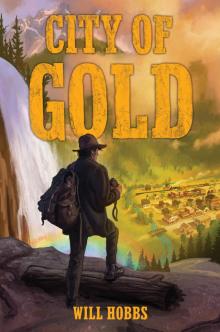 City of Gold
City of Gold Kokopelli's Flute
Kokopelli's Flute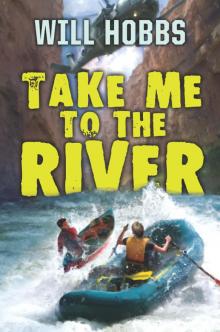 Take Me to the River
Take Me to the River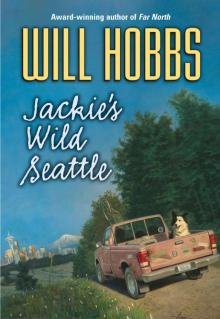 Jackie's Wild Seattle
Jackie's Wild Seattle The Maze
The Maze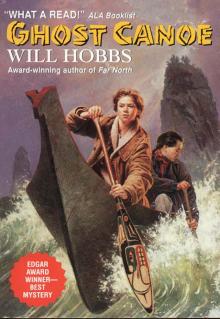 Ghost Canoe
Ghost Canoe Never Say Die
Never Say Die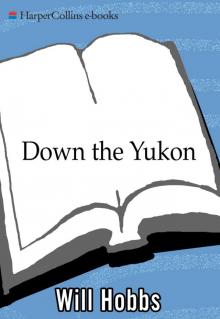 Down the Yukon
Down the Yukon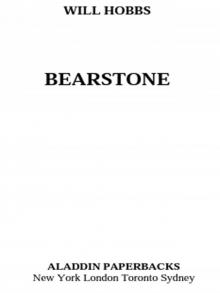 Bearstone
Bearstone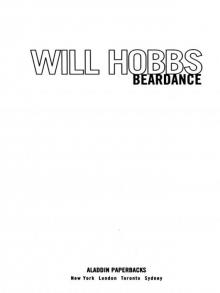 Beardance
Beardance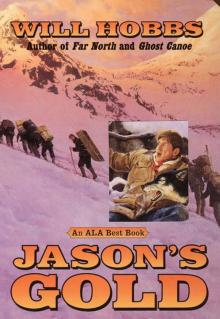 Jason's Gold
Jason's Gold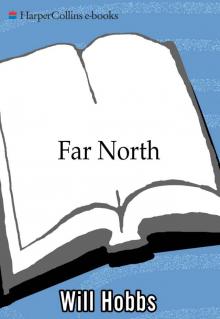 Far North
Far North The Big Wander
The Big Wander River Thunder
River Thunder Downriver
Downriver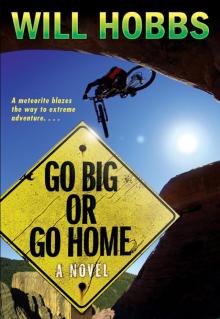 Go Big or Go Home
Go Big or Go Home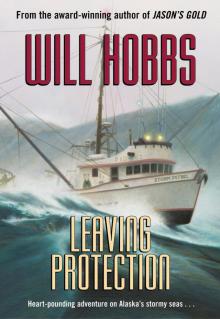 Leaving Protection
Leaving Protection Wild Man Island
Wild Man Island